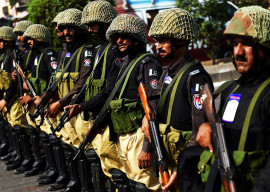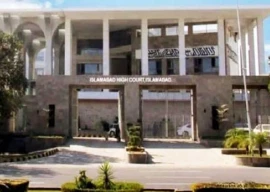
As border tension continues to hinder relations between Pakistan and India, those who were optimistic for a future reconciliation are now left to second guess.
It was not surprising to see IBA Director Dr Ishrat Husain saying at a recently held ceremony that “he is less optimistic today about India-Pakistan trade compared to the time when Manmohan Singh was leading India”.

It was not only Husain who shared these feelings that evening. Some textile tycoons said that things have deteriorated pretty quickly since Narendra Modi came to power. More than one textile exporter commented that they would avoid visiting India in the current antagonistic environment.
The current situation has already started haunting business communities as Pakistanis are facing difficulties in obtaining Indian visas.
“Except for a few prominent businessmen, majority are not receiving their visas. This deliberate attempt from the new Indian government speaks volumes for what it is going to do in the future,” a Pakistani businessperson, who regularly visits India, said on condition of anonymity.
It is not the first time in the last few years, during which the two hostile neighbours tried moving forward to an era of liberalised trade, the two countries are locking horns.
In January 2013, when the two countries were taking steps for increased bilateral trade, tension at borders convinced many in both countries that this would continue to be a bumpy ride.
Last year, due to efforts of both the previous governments, trade between India and Pakistan grew by over 20% to reach around $2.5 billion.
According to independent observers, bilateral trade can sharply jump to $6 billion in the next few years if the two countries facilitate each other’s exports.

At present, most of the trade between India and Pakistan takes place via Dubai and its volume is estimated to be well over $4 billion.
Some Pakistani businesspersons, especially those who wanted to see swift developments on Pak-India trade, believe the Nawaz Sharif government has missed the train.
Looking at the hawkish stand of the new Indian government on different issues, they say, it was a tactical mistake on Nawaz Sharif’s part when he put on hold important trade decisions for the new government.
The present government, known for its pro-business policies, wanted liberalised trade with India but, like many of its policies, it moved slowly at this front too.
Later, when it got the chance to seal some important trade deals, it delayed them. The policymakers hoped for better working relationship with the upcoming pro-business BJP government, led by Narendra Modi, but now it seems like it took a terrible gamble.
The Modi government’s anti-Pakistan tirade has particularly fuelled the fire ignited by recent border incidents in which dozens of people have already been killed on both sides.
The current situation has gone more than one step backward where the leaders of the two countries are trading hostile statements in place of commodities.
Even after the statement from Commerce Minister Khurram Dastgir Khan who said that Pakistan will continue to trade with India despite current border tensions, the two countries are bound to face serious problems whenever they sit to discuss the most favoured nation status and other major trade issues.
THE WRITER IS A STAFF CORRESPONDENT
Published in The Express Tribune, November 3rd, 2014.
Like Business on Facebook, follow @TribuneBiz on Twitter to stay informed and join in the conversation.
COMMENTS (2)
Comments are moderated and generally will be posted if they are on-topic and not abusive.
For more information, please see our Comments FAQ













































Twenty years since they got mfn they forget how to respond.
Somehow Pakistan conveniently forgets that its been 2 decades since we granted you MFN status and you are yet to reciprocate!!